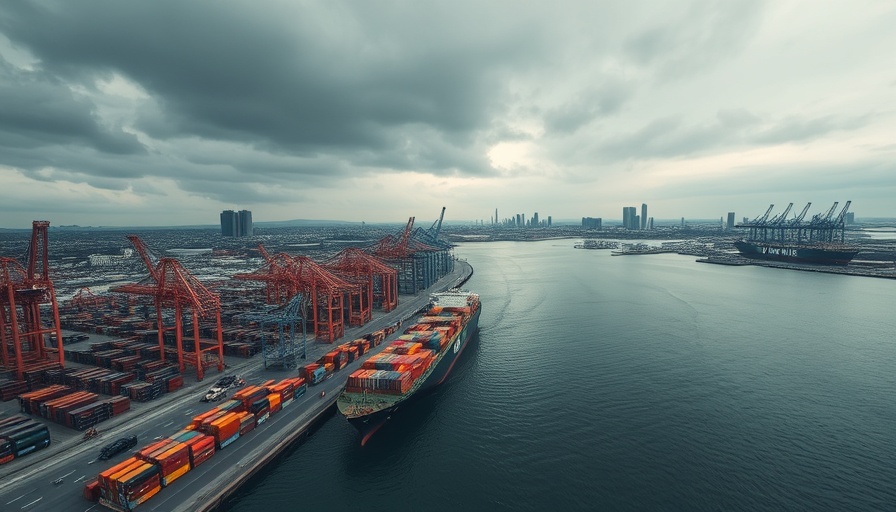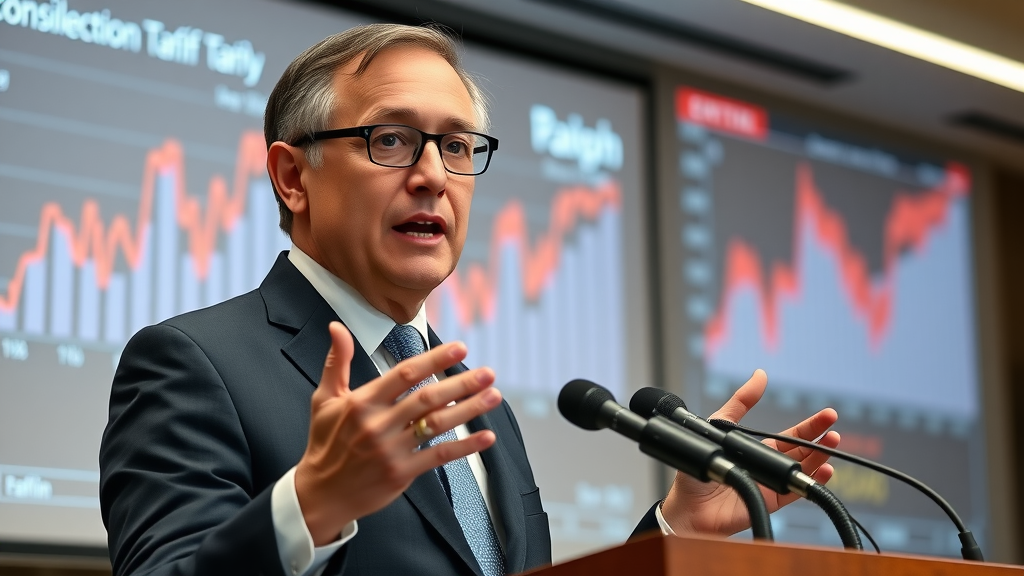Did you know that over $550 billion worth of Chinese goods have been hit by US tariffs, raising costs for American families and businesses alike? As the trade war and shifting tariff rates continue making headlines, countless people are asking: What products are affected by US tariffs —and why should you care? From the biggest manufacturers to everyday shoppers, the ripple effects disrupt global routines and impact wallets. This article digs deep, exploring the far-reaching consequences of these tariffs, and offers expert perspectives you won’t find elsewhere. How US Tariffs Reshape Global Trade: Startling Facts and First Impressions Revealing the Scope – Billions of Dollars and Untold Consequences “As of 2022, over $550 billion worth of Chinese goods have been targeted by US tariffs — driving up costs for businesses and consumers.” When the United States launches tariffs, the entire global economy listens. The trade war triggered by US tariffs hasn't just affected titanic multinational corporations but reverberated all the way down to middle-class shoppers, local farms, and small businesses. The remarkable scope includes electronics, vehicles, and agricultural exports worth billions of dollars, creating chain reactions throughout the world. Due to higher tariff rates , some industries experience windfalls—while others face layoffs and declining sales. The magnitude of the impact on auto parts, consumer goods, steel, and aluminum cannot be overstated. Manufacturers and shoppers alike are prompted to reconsider supply chain strategies, seek alternative sources, and brace for unpredictable price swings. As we dissect what products are affected by US tariffs, these dramatic shifts leave no stakeholder untouched. Answering the Central Question: What Products Are Affected by US Tariffs? Overview of Products Facing US Tariffs in the Current Trade War What products are affected by US tariffs? The answer evolves as trade negotiations twist and turn, but the major categories remain fiercely debated: electronics, automobiles, agricultural products, textiles, metals like steel and aluminum, consumer goods, and complex industrial machinery. These items have faced steep tariff rate increases since the onset of the trade war. Each new trade deal and round of retaliation triggers another update to the list, resulting in a constantly shifting landscape. Behind every imported laptop or car part at your local store lies a complicated web of negotiations, reciprocal tariffs, and heated policy debates involving top trading partners across North America, Asia, and Europe. Electronics Automobiles Agricultural products Textiles Steel and aluminum Consumer goods Machinery Industries Most Impacted: From Consumer Electronics to Agriculture Industries at the epicenter of the US tariff battle include consumer electronics, automotive manufacturing, and agriculture. For American consumers, these are not abstract terms—laptops, mobile phones, and cars are among the big-ticket items now burdened by increased costs due to higher tariffs . Farmers have seen the market for soybeans, pork, and dairy shrink significantly as reciprocal tariffs from China and others reduce US export competitiveness. Steel and aluminum tariffs, another hallmark of the ongoing trade war, have upended supply chains for sectors ranging from construction to aerospace. Meanwhile, the textiles and footwear industries feel the squeeze as US companies grapple with hard choices between eating the new expenses or passing them to buyers. In this environment, companies across North America, from Canada and Mexico to the United States, adapt rapidly or risk being left behind. Industries Most Impacted by US Tariffs Industry Key Tariffed Products Tariff Rate (%) Electronics Smartphones, laptops 15-25 Automobiles Cars, parts 10-25 Agriculture Soybeans, pork, dairy 15-25 Metals Steel, aluminum 10-25 Textiles Apparel, footwear 10-25 International Repercussions: How Trade Deals and the Trade War Shape Product Lists The global impact of US tariffs cannot be separated from ongoing trade deals and the larger trade war narrative. When the United States imposes new tariffs, key trading partners like the European Union , China, and others respond in kind, shifting product lists almost instantly. Some countries, including South Korea and others in emerging markets, have pivoted to new trade agreements to sidestep US tariff hikes. For instance, retaliatory tariffs are routinely adjusted by US trading partners, targeting American agricultural goods, auto parts, and industrial products. These policy shifts feed a cycle of constant recalibration: businesses, farmers, and manufacturers must watch the headlines to know which products are suddenly at risk with each new round of trade deals. The Role of Trade War and President Trump’s Approach to Tariffs Trade War in Action: Historical Overview “The Trump administration’s tariff strategy marked a significant shift in US trade policy, drastically altering the flow of global commerce.” The trade war initiated under President Donald Trump’s tenure marks one of the most consequential moments in recent US economic history. By challenging existing trade deals, Trump announced waves of tariffs aimed largely at China but affecting imports from Canada and Mexico, South Korea, and the European Union as well. Prioritizing a strategy of economic leverage, the Trump administration used tariff rates as bargaining chips, prompting trading partners to offer concessions or sign new trade agreements . The evolution of this trade war — from steel and aluminum hikes to sweeping sanctions on Chinese technology and agricultural goods — highlights the intersection of international politics and everyday economics. President Trump and the Escalation of Tariff Strategies Under President Trump , the United States shifted from decades of open-market policies toward aggressive protectionism. By using tariffs as both a stick and a carrot, the administration sought to reduce the nation’s trade deficit , protect domestic manufacturers, and punish countries accused of unfair trade practices. Trump’s goals were clear, if controversial: encourage reciprocal tariffs from longtime trading partners, secure more favorable trade deals , and revive sectors, such as steel and auto manufacturing, long battered by international competition. While some domestic industries welcomed the moves, downstream businesses and American consumers warned of mounting costs and growing global uncertainty. Tariff Rate Evolution: Key Increases and Their Rationales The decision to raise tariff rates was never made lightly—each announcement was carefully calibrated to maximize leverage ahead of trade negotiations . Tariffs on steel and aluminum set at 25% and 10%, respectively, served both as leverage and deterrent, while tariffs of 10–25% on electronics, auto parts, and consumer goods put pressure on high-value imports. The underlying plan was to incentivize overseas companies to invest in American manufacturing or accept tighter trade agreements . Some policy experts, however, note that price increases eventually trickle down, counteracting initial benefits by inflating costs for businesses and consumers alike. Trade Deals: From the European Union to China Negotiating with the European Union: Major Commodity Impacts The European Union has repeatedly found itself in the crosshairs of US tariff policy. Retaliatory measures and reciprocal tariffs on American whisky, motorcycles, and agricultural goods have flowed in both directions as each side attempts to protect their industries. Notably, trade deals with the EU have targeted pharmaceuticals, chemicals, and foodstuffs. Despite attempts at resolution, this standoff underscores the fragile nature of international trade agreements . Every new round of negotiations threatens—or promises—to add (or remove) more products from the list of goods affected by US tariffs and reciprocal measures. US-China Trade Deals: The Shifting Product Targets Perhaps no bilateral relationship has been more dramatically reshaped than that between the US and China. Each new trade deal reconfigures which electronics, agricultural products, and machinery face tariffs. The so-called “Phase One” trade agreement saw some tariffs rolled back, but many remained in place, signaling that the lists of affected products are anything but static. The sheer volume of billions of dollars in products affected underscores that the trade war is not over, merely evolving as economic and geopolitical realities shift. Consequences: Impact on Prices and the US Economy How Tariffs Raise Prices for Americans One of the most significant downsides of US tariffs is the way they raise prices on everyday goods. Retailers and importers, faced with higher tariffs on imported products, frequently pass these costs along. This means items like electronics, clothing, and even everyday groceries experience a notable price increase at check-out. The American consumer ultimately shoulders the burden. Whether it's shopping for a back-to-school laptop, a new family car, or basic food staples, these higher prices ripple through household budgets—impacting everything from the cost of living to the choices people make about what to buy and when. Winners and Losers: Who Benefits and Who Pays? “While domestic producers sometimes benefit from protection, downstream industries and consumers often bear higher costs.” There’s no simple scorecard in the aftermath of US tariff policy. While certain sectors—like US steel mills—see a modest uptick in domestic demand, many more businesses report lost markets and reduced competitiveness. Auto parts suppliers, for example, often find it impossible to source key components at competitive prices. Downstream industries, retailers, and the average American face cascading costs. Jobs may be preserved in one sector but lost in others, and the trade war often means companies have to either absorb losses, reduce hiring, or pass costs to employees and consumers. Policy choices about tariff rates can drive significant change in both expected and unexpected ways. The Ripple Effect: Tariffs and Supply Chains Tariffs rarely impact just one link in the global supply chain. Instead, they spread, causing disruptions that reach across entire industries. When tariff rates spike, companies are forced to rethink longstanding supplier relationships, potentially rerouting orders to new countries and confronting differing trade deals and logistical challenges. The sight of shipping containers stacking up at US ports is a visible sign of these complexities. Supply chains that once relied on seamless trade now contend with delays, added administrative hurdles, and mounting costs—challenges that ultimately rebound on the consumer. How American Companies Shift Supply Chains Post-Tariff Many American companies are now actively diversifying their supply chains to minimize exposure to tariffs. Some businesses move manufacturing out of China to countries in Southeast Asia or even back to North America, where new trade agreements create less risk of sudden duties. However, shifting a supply chain often involves major upfront costs, regulatory headaches, and trade deal uncertainties. While the potential for long-term savings exists, the immediate effect is increased complexity and unpredictability—problems felt by both corporate executives and their customers. Analyzing Product Lists: Key Examples of US Tariff Targets Steel, Aluminum, and Critical Industrial Goods Steel and aluminum tariffs upended global markets and resurrected domestic debates about industrial policy. Products ranging from construction beams to cans and car components drew new tariff rates. The changes sent shockwaves across manufacturing, construction, and even packaging industries. The result? While some US plants have seen increased activity, others struggle with higher input costs and trade partners like Canada, Mexico, and the European Union responded with reciprocal measures. These complexities highlight the deeply interconnected nature of global commerce and the far-reaching impact of US trade policy. Agricultural Goods: Soybeans, Pork, Corn, and Dairy US farmers were among the hardest hit when major agricultural products—including soybeans, pork, corn, and dairy —were placed on retaliatory tariff lists by China and others. Markets for these commodities shrank overnight as trading partners targeted American goods in response to new US import duties. Farmers faced falling prices, mounting inventories, and uncertain future trade agreements. Many turned to domestic subsidies or sought new buyers in countries like India and other parts of Asia, but the price for lost Chinese business has been steep. These experiences underscore the critical link between trade war negotiations and American livelihoods. Consumer Goods: Electronics, Apparel, Toys The pain of tariffs is most immediate when it affects household purchases. Electronics, clothing, footwear, and toys are all on the list of products seeing higher prices thanks to trade policy changes. Parents may notice back-to-school shopping is more expensive; businesses may stagger investment in new technologies as laptop and component prices climb. As consumer goods face added costs at each step of the supply chain, the option to “buy American” doesn’t always mean lower prices—or easier choices. Automotive Sector: Cars, Parts, and Supply Chains Automobiles and auto parts sit at a crossroads in the tariff debate. US manufacturers face higher tariff rates on imported components, which strains supply chains and threatens jobs both at home and abroad. Dealers and repair shops also grapple with higher input costs, creating a knock-on effect throughout the industry. In many cases, increased expenses must be balanced against competitive pressures—an especially tough act as car buyers watch for deals in a market roiled by policy uncertainty. Global Trade Shifts: How Tariffs Change the Landscape Trade War Impacts Beyond the US – Europe, Asia, and Emerging Markets The trade war and new tariffs don’t just affect the United States—they also shake markets in Europe, Asia, and beyond. As the US imposes duties, countries like India, South Korea, and China respond with reciprocal tariffs that roil international supply chains and investment strategies. Emerging markets are especially vulnerable, with local industries racing to adapt as new trade agreements and tariffs rewrite the rulebook of global commerce. The Russian oil trade and imports from India provide fresh alternatives for some partners, while North American links are tested by shifting tariff rates and new regulatory hurdles. Retaliatory Tariffs: How Other Countries Respond to US Measures Retaliatory tariffs have quickly become the norm among America’s trading partners. Whether it’s the European Union, Canada, Mexico, China, or South Korea , affected countries craft policies to protect their own industries and retaliate in kind. This cycle fuels new trade deals and adjustments in global partnerships—sometimes opening doors for competitors from countries not covered by the latest tariffs. The result is a constantly shifting map of winners and losers, with product lists changing to reflect the realities of ongoing trade negotiations. Case Study: How the European Union Responded to US Tariffs When faced with US tariffs on steel, aluminum, and agricultural products, the European Union was among the first to craft a strategic response. Imposing reciprocal tariffs on iconic American goods such as bourbon, motorcycles, and denim, the EU aimed to inflict targeted economic pain and bring US negotiators back to the table. These actions highlight how trade deals and policy decisions can swiftly reshape the fate of entire product categories, underscoring the fluid nature of international commerce. Policy Debates: The Case for and Against US Tariffs Pro-Tariff Arguments: Protecting American Industry Supporters of US tariffs see them as necessary tools to shield American manufacturers, revive lost jobs, and restore balance in key industries. Proponents frequently cite the need to address unfair trade practices abroad, especially from countries that employ subsidies, currency manipulation, or industrial espionage to gain an advantage. For advocates, the higher costs brought by tariffs are justified as long-term investments: putting pressure on trading partners to reach more favorable trade deals and ensuring American workers are not at a perpetual disadvantage. Anti-Tariff Arguments: Cost to Consumers and Global Markets “Tariffs may provide short-term relief for specific sectors, but risk sparking prolonged trade war cycles.” Critics of US tariffs point to the immediate impact on American consumers : price increases on everyday items, supply chain disruptions, and uncertainty for businesses. They stress that trade war dynamics too often result in lost export markets, job losses in downstream industries, and long-term damage to the country’s global competitiveness. Many warn that tariffs can trigger tit-for-tat retaliation, creating new barriers instead of fostering meaningful trade reforms. What You'll Discover About Products Affected by US Tariffs Major commodities and goods on current tariff lists Insights into tariff rates and their economic impact How trade deals influence tariffed product lists Perspectives from affected industries Policy opinions shaping the current landscape Watch our animated explainer for a fast, visual breakdown of how US tariffs impact leading product categories, global trade flows, and your wallet. Educational narration reveals the stakes for industry, agriculture, and consumers in just a few minutes. People Also Ask: What Items Does the US Have Tariffs On? US Tariffs by Product: A Comprehensive Breakdown “From solar panels to clothing and industrial parts, US tariffs touch a wide range of imported products.” American tariffs currently apply to thousands of distinct items, including electronics (smartphones, laptops), auto parts and cars , agricultural products (soybeans, pork, dairy), industrial goods , textiles and apparel , and consumer goods ranging from toys to home appliances. As each trade deal is signed or adjusted, the scope of what products are affected by US tariffs expands or contracts—making it imperative for businesses and consumers to stay updated. Items can shift from one list to another quickly, especially amid the ongoing trade war . Key sources for the most current information include the US Trade Representative’s website and official government releases on trade negotiations. People Also Ask: What Industries Are Most Affected by Tariffs? Industry Deep-Dive: Who Feels the Pinch from Tariffs? While no industry is immune, technology, agriculture, automotive, steel and aluminum, and apparel are principally impacted. These sectors intertwine with global suppliers, so when tariff rates change, access to affordable parts and new markets can evaporate overnight. Many downstream industries also suffer as the cost of materials and components rises. Retailers, logistics companies, and small businesses face particular challenges managing the effects of the trade war on daily operations and profit margins. People Also Ask: What Are the Three Main Effects of Tariffs? Key Effects: Price Increases, Domestic Industry Protection, and Global Trade War Reprisals The three primary effects are: Price increases for consumers and businesses as tariffs are passed down supply chains Protection for domestic industries as foreign goods become less competitive in the US market Retaliatory measures that spark ongoing trade war cycles and disrupt global supply chains People Also Ask: Why Did Donald Trump Tariffs? Presidential Intentions: Justifications for US Tariff Actions The primary rationale cited by President Trump and advisors was to correct longstanding trade imbalances and force fairer trade deals with major partners, particularly China. By raising tariff rates and threatening new duties, the administration sought to protect vulnerable domestic industries and put pressure on trading partners accused of unfair practices. Whether one sees this as strategic foresight or mere brinkmanship, the impact on what products are affected by US tariffs will shape economic debates—and everyday prices—for years to come. FAQs About What Products Are Affected by US Tariffs Do tariffs change yearly? Yes, tariff lists and rates can change annually depending on trade negotiations, economic needs, or political shifts. Governments periodically review schedules, especially as new trade deals are crafted or as trade war conditions change. Are there exceptions for certain products? Some products may secure exemptions due to national security concerns, domestic shortages, or after industry lobbying. Check announcements from the US Trade Representative for updates on exemptions. How do tariffs impact small businesses? Small businesses often lack the leverage and resources to negotiate lower costs or diversify suppliers, making them especially vulnerable to new tariffs and price increases. What is the current status of trade deals related to tariffs? Statuses change rapidly; agreements like the “Phase One” US-China deal and amendments to NAFTA (now USMCA) brought some relief but left many tariffs in place. Ongoing negotiations and global events will drive further changes. Summing Up: The Far-Reaching Effects of US Tariffs on Products and Global Trade Key takeaways and ongoing debates about tariff policy The future outlook for affected products Take actionable steps: Follow trade developments, call for transparency on which products face new tariffs, and support efforts to ensure fair deals for every industry and consumer. Take the Next Step: Get Involved or Learn More Interested in authoring or sharing your insights? Call Global Trade News at 203 271 7991 for more information. The recent escalation in U.S. tariffs has significantly impacted a wide array of imported products, leading to increased costs for American consumers and businesses. Key categories affected include consumer electronics, automobiles and parts, agricultural goods, textiles and apparel, and industrial metals. Consumer Electronics: Items such as smartphones, laptops, and tablets from countries like China and South Korea now face tariffs up to 145%, resulting in price hikes of 20–46% and prompting shifts in sourcing to countries like Vietnam and India. ( usimportdata.com ) Automobiles and Parts: Imported vehicles and components, particularly from Mexico, Germany, and Japan, are subject to tariffs ranging from 25% to 35%. This has led to increased car prices by $3,500 to $15,000 and has affected the supply chain for electric vehicles. ( usimportdata.com ) Agricultural Goods: Products such as soybeans, pork, and dairy from countries like Mexico and Canada are now facing tariffs between 21% and 25%. This has contributed to food inflation, with notable price increases in items like tomatoes and avocados. ( usimportdata.com ) Textiles and Apparel: Clothing and footwear imports, primarily from China and Vietnam, are experiencing tariffs between 10% and 45%. This has led to higher prices for consumers and has squeezed profit margins for retailers. ( usimportdata.com ) Industrial Metals: Steel and aluminum products from countries including China, Brazil, and Canada are now subject to tariffs exceeding 25%. This has resulted in increased costs for construction and packaging industries. ( usimportdata.com ) These tariffs have raised the average U.S. import tax rate to 18.6%, the highest since 1933, and are projected to cost U.S. households an estimated $2,400 annually. ( apnews.com ) Recent Developments on U.S. Tariffs and Global Trade: What US consumers can expect from new tariffs on imported goods Trump’s higher tariffs hit major US trading partners, sparking defiance and concern Trump’s tariffs take effect today. When and how they will affect you

 Add Row
Add Row  Add
Add 




Write A Comment